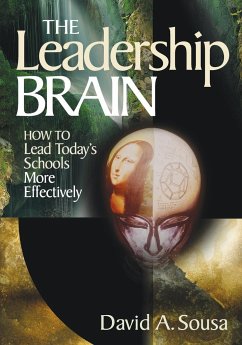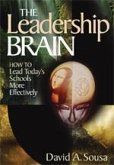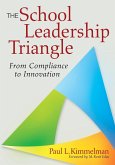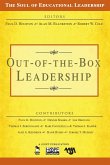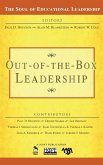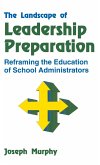- Broschiertes Buch
- Merkliste
- Auf die Merkliste
- Bewerten Bewerten
- Teilen
- Produkt teilen
- Produkterinnerung
- Produkterinnerung
This powerful resource includes valuable self-assessment tools, resources, and practical applications that will help instructional leaders develop a modern, creative, team-centered school.
Andere Kunden interessierten sich auch für
![The Leadership Brain The Leadership Brain]() David A. SousaThe Leadership Brain101,99 €
David A. SousaThe Leadership Brain101,99 €![The School Leadership Triangle The School Leadership Triangle]() Paul L. KimmelmanThe School Leadership Triangle36,99 €
Paul L. KimmelmanThe School Leadership Triangle36,99 €![Leadership and the Force of Love Leadership and the Force of Love]() John R. HoyleLeadership and the Force of Love32,99 €
John R. HoyleLeadership and the Force of Love32,99 €![The Landscape of Leadership Preparation The Landscape of Leadership Preparation]() Joseph MurphyThe Landscape of Leadership Preparation36,99 €
Joseph MurphyThe Landscape of Leadership Preparation36,99 €![Out-of-the-Box Leadership Out-of-the-Box Leadership]() Paul D. HoustonOut-of-the-Box Leadership37,99 €
Paul D. HoustonOut-of-the-Box Leadership37,99 €![Out-of-the-Box Leadership Out-of-the-Box Leadership]() Paul D. HoustonOut-of-the-Box Leadership80,99 €
Paul D. HoustonOut-of-the-Box Leadership80,99 €![The Landscape of Leadership Preparation The Landscape of Leadership Preparation]() Joseph MurphyThe Landscape of Leadership Preparation86,99 €
Joseph MurphyThe Landscape of Leadership Preparation86,99 €-
-
-
This powerful resource includes valuable self-assessment tools, resources, and practical applications that will help instructional leaders develop a modern, creative, team-centered school.
Hinweis: Dieser Artikel kann nur an eine deutsche Lieferadresse ausgeliefert werden.
Hinweis: Dieser Artikel kann nur an eine deutsche Lieferadresse ausgeliefert werden.
Produktdetails
- Produktdetails
- Verlag: Corwin
- Seitenzahl: 322
- Erscheinungstermin: 30. April 2003
- Englisch
- Abmessung: 254mm x 178mm x 17mm
- Gewicht: 608g
- ISBN-13: 9780761939108
- ISBN-10: 0761939105
- Artikelnr.: 21438850
- Herstellerkennzeichnung
- Produktsicherheitsverantwortliche/r
- Europaallee 1
- 36244 Bad Hersfeld
- gpsr@libri.de
- Verlag: Corwin
- Seitenzahl: 322
- Erscheinungstermin: 30. April 2003
- Englisch
- Abmessung: 254mm x 178mm x 17mm
- Gewicht: 608g
- ISBN-13: 9780761939108
- ISBN-10: 0761939105
- Artikelnr.: 21438850
- Herstellerkennzeichnung
- Produktsicherheitsverantwortliche/r
- Europaallee 1
- 36244 Bad Hersfeld
- gpsr@libri.de
DR. David A. Sousa is an international consultant in educational neuroscience and author of more than twenty books that suggest ways educators and parents can translate current brain research into strategies for improving learning. A member of the Cognitive Neuroscience Society, he has conducted workshops in hundreds of school districts on brain research, instructional skills, and science education at the preK-12 and university levels. He has made presentations to more than two hundred thousand educators at national conventions of educational organizations and to regional and local school districts across the United States, Canada, Europe, Australia, New Zealand, and Asia. Dr. Sousa has a bachelor's degree in chemistry from Bridgewater State University in Massachusetts, a master of arts in teaching degree in science from Harvard University, and a doctorate from Rutgers University. His teaching experience covers all levels. He has taught senior high school science and served as a K-12 director of science, supervisor of instruction, and district superintendent in New Jersey schools. He was an adjunct professor of education at Seton Hall University for ten years and a visiting lecturer at Rutgers University. Prior to his career in New Jersey, Dr. Sousa taught at the American School of Paris (France) and served for five years as a foreign service officer and science advisor at the US diplomatic missions in Geneva (Switzerland) and Vienna (Austria). Dr. Sousa has edited science books and published dozens of articles in leading journals on professional development, science education, and educational research. His most popular books for educators include How the Brain Learns, now in its sixth edition; How the Special Needs Brain Learns , second edition; How the Gifted Brain Learns; How the Brain Learns to Read , second edition; How the Brain Influences Behavior; How the ELL Brain Learns; Differentiation and the Brain, second edition (with Carol Tomlinson); and How the Brain Learns Mathematics, second edition, which was selected by the Independent Book Publishers Association as one of the best professional development books. The Leadership Brain suggests ways for educators to lead today's schools more effectively. Dr. Sousa's books have been published in French, Spanish, Chinese, Arabic, Korean, Russian, and several other languages. His book Brainwork: The Neuroscience Behind How We Lead Others is written for business and organizational leaders. Dr. Sousa is past president of the National Staff Development Council (now called Learning Forward). He has received numerous awards from professional associations, school districts, and educational foundations for his commitment to research, staff development, and science education. He received the Distinguished Alumni Award and an honorary doctorate from Bridgewater State University and an honorary doctorate in humane letters from Gratz College in Philadelphia. Dr. Sousa has been interviewed on the NBC Today show, by other television programs, and by National Public Radio about his work with schools using brain research. He makes his home in south Florida.
About the Author
Introduction
Changing Americäs Schools
About this Book
1. Understanding Leadership
Schools Need True Leaders
Attribute of a Leader
Organizational Expectations
Leadership Styles
What Style of Leader Am I?
Impact of Brain Research on Leadership
Major Points in Chapter 1
2. Linking Leadership to the Brain
Brain Structure and Function
Learning and Retention
Leadership and the Brain
Creativity
Imagery (Visualization)
Major Points in Chapter 2
3. Brain-Compatible Curriculum
Students Expectations About Learning
Deciding What Should Be Learned
Revising Curriculum
Curriculum for Special Needs Students
Integrating Technology into the Classroom
The Pitfalls of Curriculum Change
Major Points in Chapter 3
4. Brain-Compatible Instruction and Assessment
Components of Brain-Compatible Instruction
Assessment
Major Points in Chapter 4
5. Teacher Evaluation
Traditional Models of Teacher Evaluation
Teacher Evaluation for the 21st Century
Designing a Comprehensive Teacher Evaluation Program
Evaluating Principals and District Office Administrators
Major Points in Chapter 5
6. Ethical and Spiritual Leadership
Ethical Leadership
Brain Research and Ethical Behavior
Spiritual Leadership
Major Points in Chapter 6
7. Transforming School Culture
Types of School Culture
Monitoring School Culture
Attitudes and Beliefs About Schooling
Attitudes and Beliefs About Students
Parents and School Culture
Transforming Through Collaboration
Working With Teams
Staff Development
Major Points in Chapter 7
8. Putting It All Together
A Whole-Brained Approach to Leadership
Developing and Retaining Educational Leaders
Major Points in Chapter 8
Glossary
References
Resources
Index
Introduction
Changing Americäs Schools
About this Book
1. Understanding Leadership
Schools Need True Leaders
Attribute of a Leader
Organizational Expectations
Leadership Styles
What Style of Leader Am I?
Impact of Brain Research on Leadership
Major Points in Chapter 1
2. Linking Leadership to the Brain
Brain Structure and Function
Learning and Retention
Leadership and the Brain
Creativity
Imagery (Visualization)
Major Points in Chapter 2
3. Brain-Compatible Curriculum
Students Expectations About Learning
Deciding What Should Be Learned
Revising Curriculum
Curriculum for Special Needs Students
Integrating Technology into the Classroom
The Pitfalls of Curriculum Change
Major Points in Chapter 3
4. Brain-Compatible Instruction and Assessment
Components of Brain-Compatible Instruction
Assessment
Major Points in Chapter 4
5. Teacher Evaluation
Traditional Models of Teacher Evaluation
Teacher Evaluation for the 21st Century
Designing a Comprehensive Teacher Evaluation Program
Evaluating Principals and District Office Administrators
Major Points in Chapter 5
6. Ethical and Spiritual Leadership
Ethical Leadership
Brain Research and Ethical Behavior
Spiritual Leadership
Major Points in Chapter 6
7. Transforming School Culture
Types of School Culture
Monitoring School Culture
Attitudes and Beliefs About Schooling
Attitudes and Beliefs About Students
Parents and School Culture
Transforming Through Collaboration
Working With Teams
Staff Development
Major Points in Chapter 7
8. Putting It All Together
A Whole-Brained Approach to Leadership
Developing and Retaining Educational Leaders
Major Points in Chapter 8
Glossary
References
Resources
Index
About the Author
Introduction
Changing Americäs Schools
About this Book
1. Understanding Leadership
Schools Need True Leaders
Attribute of a Leader
Organizational Expectations
Leadership Styles
What Style of Leader Am I?
Impact of Brain Research on Leadership
Major Points in Chapter 1
2. Linking Leadership to the Brain
Brain Structure and Function
Learning and Retention
Leadership and the Brain
Creativity
Imagery (Visualization)
Major Points in Chapter 2
3. Brain-Compatible Curriculum
Students Expectations About Learning
Deciding What Should Be Learned
Revising Curriculum
Curriculum for Special Needs Students
Integrating Technology into the Classroom
The Pitfalls of Curriculum Change
Major Points in Chapter 3
4. Brain-Compatible Instruction and Assessment
Components of Brain-Compatible Instruction
Assessment
Major Points in Chapter 4
5. Teacher Evaluation
Traditional Models of Teacher Evaluation
Teacher Evaluation for the 21st Century
Designing a Comprehensive Teacher Evaluation Program
Evaluating Principals and District Office Administrators
Major Points in Chapter 5
6. Ethical and Spiritual Leadership
Ethical Leadership
Brain Research and Ethical Behavior
Spiritual Leadership
Major Points in Chapter 6
7. Transforming School Culture
Types of School Culture
Monitoring School Culture
Attitudes and Beliefs About Schooling
Attitudes and Beliefs About Students
Parents and School Culture
Transforming Through Collaboration
Working With Teams
Staff Development
Major Points in Chapter 7
8. Putting It All Together
A Whole-Brained Approach to Leadership
Developing and Retaining Educational Leaders
Major Points in Chapter 8
Glossary
References
Resources
Index
Introduction
Changing Americäs Schools
About this Book
1. Understanding Leadership
Schools Need True Leaders
Attribute of a Leader
Organizational Expectations
Leadership Styles
What Style of Leader Am I?
Impact of Brain Research on Leadership
Major Points in Chapter 1
2. Linking Leadership to the Brain
Brain Structure and Function
Learning and Retention
Leadership and the Brain
Creativity
Imagery (Visualization)
Major Points in Chapter 2
3. Brain-Compatible Curriculum
Students Expectations About Learning
Deciding What Should Be Learned
Revising Curriculum
Curriculum for Special Needs Students
Integrating Technology into the Classroom
The Pitfalls of Curriculum Change
Major Points in Chapter 3
4. Brain-Compatible Instruction and Assessment
Components of Brain-Compatible Instruction
Assessment
Major Points in Chapter 4
5. Teacher Evaluation
Traditional Models of Teacher Evaluation
Teacher Evaluation for the 21st Century
Designing a Comprehensive Teacher Evaluation Program
Evaluating Principals and District Office Administrators
Major Points in Chapter 5
6. Ethical and Spiritual Leadership
Ethical Leadership
Brain Research and Ethical Behavior
Spiritual Leadership
Major Points in Chapter 6
7. Transforming School Culture
Types of School Culture
Monitoring School Culture
Attitudes and Beliefs About Schooling
Attitudes and Beliefs About Students
Parents and School Culture
Transforming Through Collaboration
Working With Teams
Staff Development
Major Points in Chapter 7
8. Putting It All Together
A Whole-Brained Approach to Leadership
Developing and Retaining Educational Leaders
Major Points in Chapter 8
Glossary
References
Resources
Index

